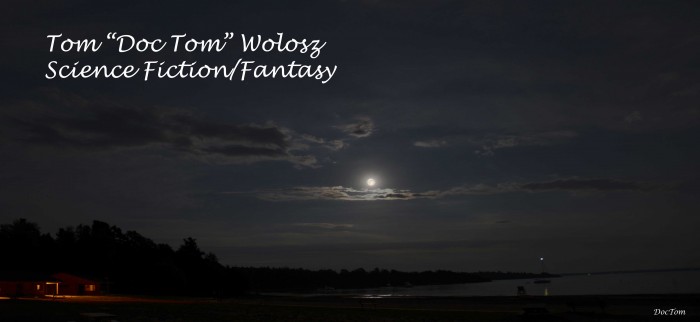Well, it’s been a while since my last post, and to get started up again I just thought I’d mention a few things that I see writers do in their first novels that really are wrong. So let me start with this:
Are you writing a novel or a screen play?
Every so often I’ll pick up a posted (unpublished or self-published) story and as I start to read the first thought that occurs is this writer watches a lot of movies or television. Why? Because there are very different styles of plot development required between writing and visual media.
In a movie or tv plot you have to throw in background material quickly, and, hopefully, subtly because you only have fifty minutes to a bit over two hours to tell your story. In a book you can develop plot in a more logical manner.
Let me give you an example. Consider the original Jurassic Park movie based on Michael Creighton’s novel. Very early on Grant, the paleontologist, starts lecturing the volunteers at the dig about attack methods in carnivorous dinosaurs (which never happens in the book). I might add that the setup was nicely done, using the little kid, who’s obviously an annoying jerk, as a catalyst. As a part of his mini-lecture Grant says something along the lines of “…you think Velociraptor’s vision is motion activated, like the T. rex….” This is important because it gives verisimilitude to the later scene where Grant protects the children from the T. rex by getting them to stand perfectly still. So what’s the problem? Well, knowing a bit about dinos, my reaction was, “How the hell does he know that?” Remember, at this point Grant has never yet met a live dino. An editor reviewing a book might have the same reaction and toss the book onto the reject pile. So how did Creighton get away with this in his book? Simple. It’s never mentioned until the first T. rex attack, and then Grant notices that the T. rex ignores stationary people, but immediately goes after those in motion. He concludes that like amphibians, the T. rex has motion activated sight or recognition. In the book this makes sense, but in a movie (unless we’re talking 1950’s scifi B movies) for Grant to explain what happened after the fact would just stop the action and kill the movie’s momentum (which is what always happened in those 1950’s scifi B movies).
Well, a recent story post I read started off with a young man saying goodbye to his wife at a train station as he prepares to go off to war. I thought the writer did a pretty good job of setting a contrast between the ‘gung ho!’ spectators and the grizzled war veterans along the station who were anything but enthusiastic. As the train leaves the scene shifts to his wife riding back home. She immediately starts thinking about how they met at the Spring dance or some such. That’s tv plotting. It shows how deeply in love they are and tosses in backstory, all in a few minutes of on-screen time. But why do that in a novel? Think about it. Unless this young woman is totally narcissistic and so independently wealthy as to have nothing to do for the next few years but pine away for hubby, daydreaming about how they met is about the last thing she’d do. Yes, she will pray for him, fear for him, etc., but tell us about the challenges she now faces (which most assuredly are on her mind). The back story can be thrown in later, at some more appropriate time – while she’s searching around the house, looking for some things she can sell to help pay the bills, or trying to decide how she can help the war effort, some memento she stumbles upon triggers the memories of that first meeting. Or maybe late at night, as she sits alone, exhausted after a long day, her mind wanders to memories of better times. Whatever, but make us believe it’s real.
I concede that if you are writing a Romance novel or some such, the above example may not apply. The first rule of writing should be obvious – always to be familiar with the genre you want to write in and be true to the conventions of that genre. Read a few books in your chosen genre and think about how the better writers plot out their stories.
In general though, leave the screen play for later. You’ll have plenty of time to worry about it once you sell the rights to your novel to a movie company.
